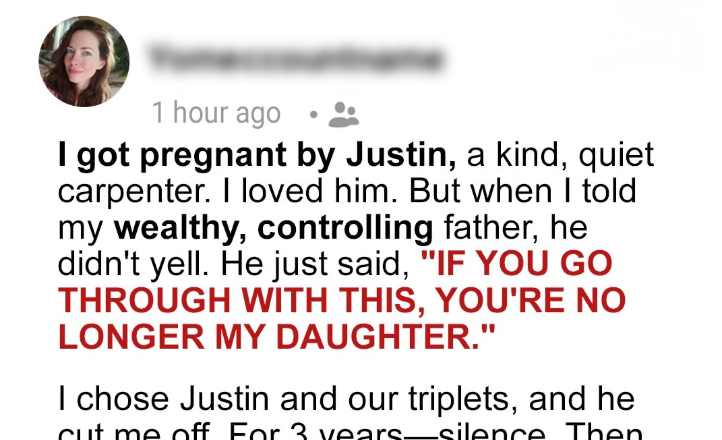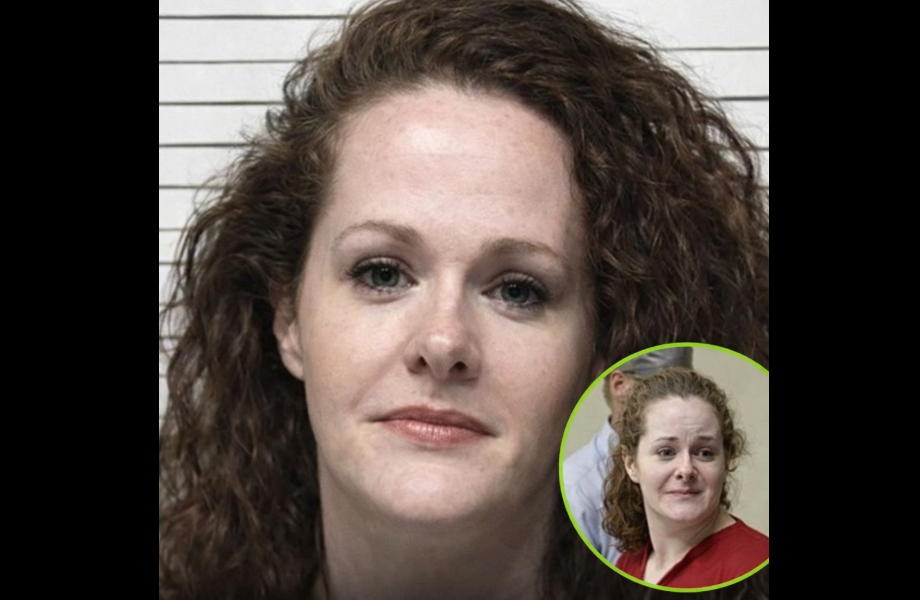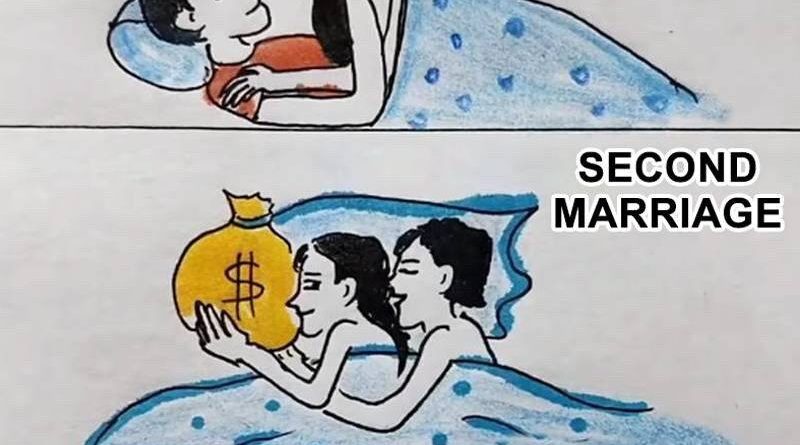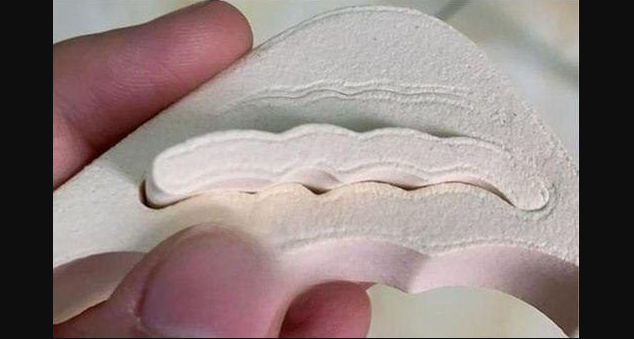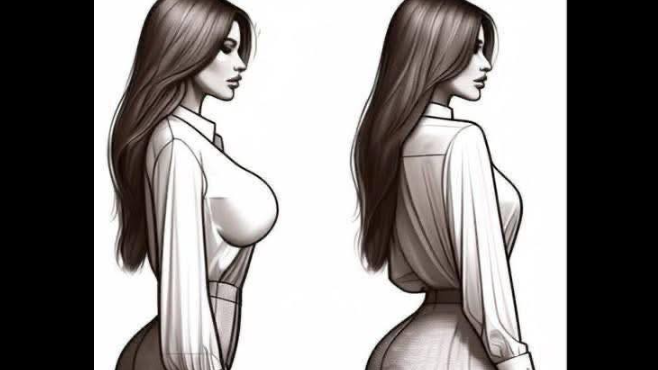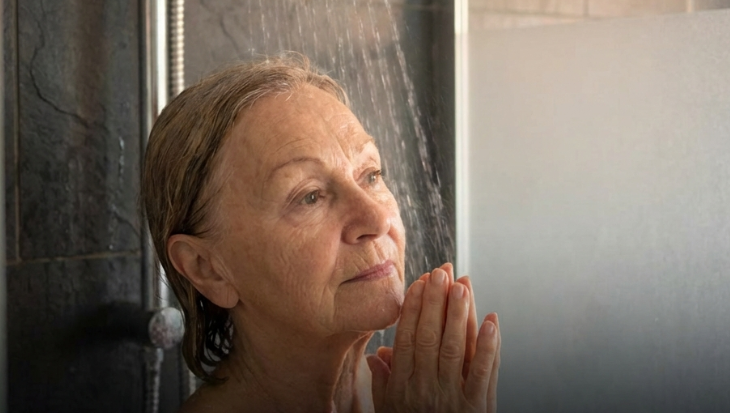I found myself pregnant with triplets by Justin, a gentle, soft-spoken carpenter who filled my heart with warmth. I adored him deeply. When I shared the news with my affluent, domineering father, he didn’t raise his voice. Instead, he delivered a chilling ultimatum: “If you proceed with this, you will no longer be my daughter.”
I chose Justin and our three children, and my father severed all ties. For three years, silence stretched between us. Then, one evening, my phone rang. His voice was icy: “I hear you have children. I’m visiting tomorrow. This is your final opportunity. You and the kids can have the life you’re meant for. But if you refuse, don’t expect another call from me.”
He arrived the next day, acting as though nothing had changed—until he stepped into our home, stopped abruptly, and exclaimed, “Oh, no! What have you done?!” Tears streamed down his face as he gazed at a photograph.
It was a picture of my mother.
Framed and displayed in our hallway.
Not an ordinary photo—it captured her at nineteen, radiant, perched on the tailgate of a pickup truck, barefoot with paint-splattered overalls. I’d discovered it in a forgotten box in the attic of my childhood home before leaving. My mother passed when I was six, her memory a faint whisper. Yet, something urged me to keep that photo.
My father stared, as if seeing a specter. He approached, his fingers trembling as they brushed the frame, then turned to me.
“You’re her mirror image,” he said. “This house—the porch, the wildflowers, the chaos in the yard—it’s like you’ve brought her back.”
His words puzzled me at first. Then, the story spilled from him.
My mother grew up on a farm near Asheville, spirited and unyielding, surrounded by simple beauty. She cherished old tools, wild gardens, and a life unburdened by excess. When she married my father, he promised her that simplicity. But when she became pregnant with me, his ambitions shifted.
He took a job in Atlanta, bought a grand house, and filled it with opulent furniture she despised. She tried to adapt, wandering barefoot on cold marble floors, murmuring, “This house feels lifeless.”
“She wept daily for a year,” he admitted softly. “I thought it was just her hormones.”
He glanced at my kitchen—the worn countertops, the spice rack Justin crafted from reclaimed wood, the fridge adorned with our daughters’ chalk art. His voice broke.
“She would have adored this,” he said.
In that moment, his demeanor softened. He stayed for dinner.
Justin grilled chicken on our modest patio. My father ate quietly, watching our girls scramble over the playset Justin built from salvaged pallets.
I thought that evening marked a new beginning. I was mistaken.
After the girls were asleep, he handed me a thick envelope filled with checks, estate papers, and account details.
“I want to buy you a proper home,” he said firmly. “One with solid insulation and reliable plumbing. I’ll set up a trust for the children. You can’t keep living like this.”
I smiled gently. “We’re managing fine.”
“You’re not,” he retorted sharply. “You work nights at a bakery. Justin repairs fences for cash. That’s not enough.”
I held my tongue. “He’s not my husband.”
His gaze hardened. “I should’ve known.”
I slid the envelope back. “We don’t need your money, Dad. We need your presence, your love. That’s all.”
He stood abruptly. “You’re exactly like your mother. Stubborn to a fault.”
He left without a word.
Another year of silence followed.
Then, in late spring, our daughter Suri fell gravely ill with a mysterious virus. She stopped eating, could barely walk. We shuttled between clinics, struggling to stay afloat. Justin worked tirelessly to keep our home running.
Desperate, I called my father.
He answered on the second ring.
“I don’t want money,” I said, voice trembling. “Suri’s sick, and I’m terrified.”
Within two hours, he was at the hospital.
He brought clothes, books, and toys for the girls. He barely acknowledged me, instead sitting by Suri’s bedside, gently brushing her hair and reading Goodnight Moon repeatedly.
Suri was discharged a week later, diagnosed with a manageable autoimmune condition—frightening but treatable.
That evening, my father asked to stay for dinner. He helped wash dishes, tucked the girls into bed, and even embraced Justin.
After that, he visited weekly.
Sometimes he brought groceries; other times, just stories of his childhood in Lebanon, picking olives from his grandmother’s trees. The girls adored him.
Gradually, my heart softened too.
One day, on the porch with Justin, watching the girls chase each other barefoot through the yard, he said something unforgettable.
“I misjudged you,” he told Justin. “You’re creating something extraordinary here. Not just a home—a world. She’d be so proud.”
Justin nodded quietly, humble as always.
Our family’s transformation was gradual but enduring.
My father attended birthday parties and dance recitals, even sitting front row when I earned my community college certificate in early education.
He offered again to buy us a house. We declined. But one day, he arrived with lumber and tools.
“I want to build a sunroom with Justin,” he said. “If you’ll allow me.”
They built it over six weekends.
It was stunning—wide windows, warm wood, brimming with light and life.
Now, I teach preschool reading groups there for neighborhood children.
Last year, we saved enough to buy the house we’d been renting. My father covered the closing costs as a gift.
A photo of my mother now hangs in the sunroom.
Below it, one of Suri—healthy, vibrant, wielding a paintbrush, laughing in barefoot overalls.
And next to it, a new photo: me and my father, arms around each other, both teary-eyed.
People sometimes ask if I regret turning down his wealth.
Never.
Because choosing this path led me to rediscover my mother within myself.
And it gave my father a second chance.
He thought our simple life was a mistake. But in the end, it showed him how to love again.
Sometimes, you don’t need to fight. You let time and love pave the way.
Thank you for reading. If this story resonated with you, please share it or leave a like ❤️
